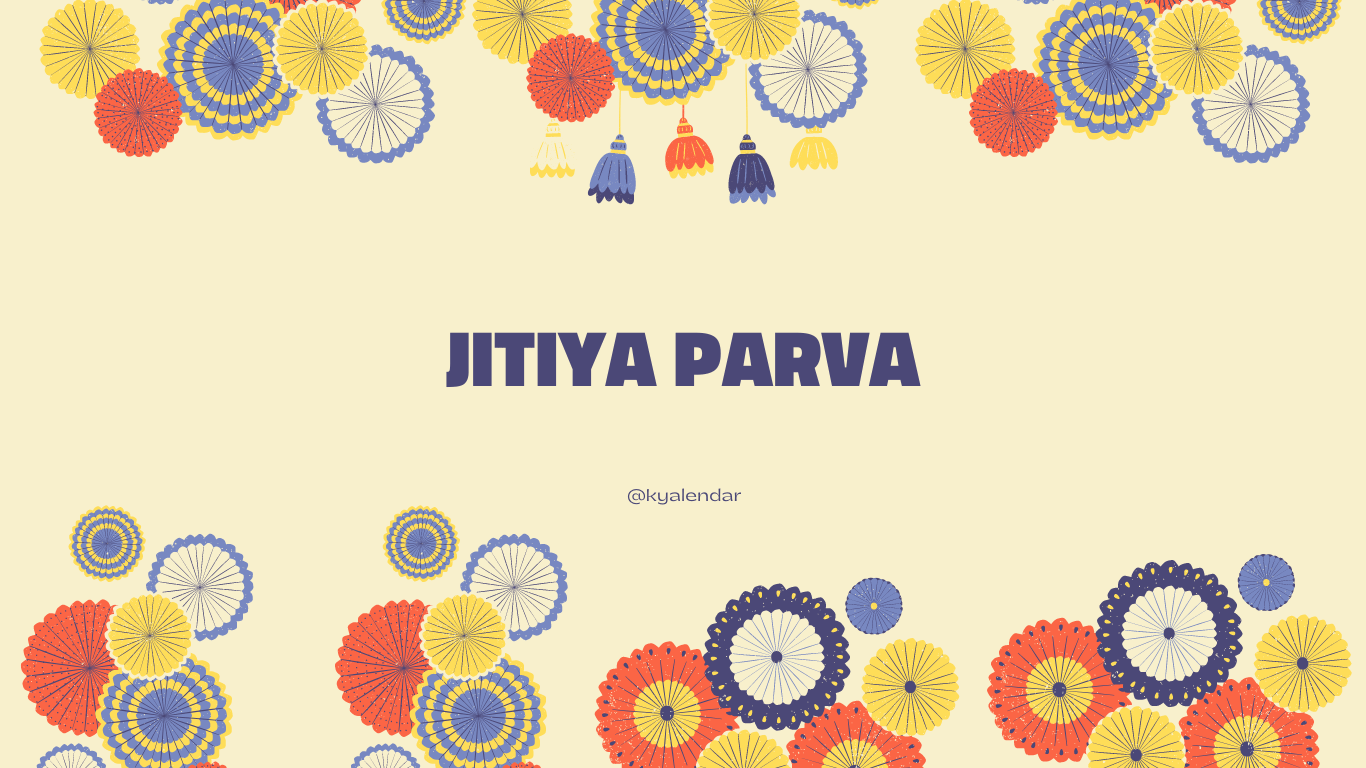
- This event has passed.
Jitiya Parva
September 25

Jitiya Parva, also known simply as Jitiya, is a significant festival predominantly observed in the Indian states of Bihar, Jharkhand, and Uttar Pradesh, as well as in parts of Nepal. This festival is dedicated to the worship of Jitiya Mata, a revered deity, and is particularly important for married women who observe it to ensure the health and longevity of their children. Celebrated with great devotion and meticulous rituals, Jitiya Parva reflects the deep cultural and religious traditions of the region.
The Significance of Jitiya Parva
Jitiya Parva takes place on the Ashtami (eighth) tithi of the lunar month of Ashwin (September-October), during the Krishna Paksha (the waning phase of the moon). The festival is primarily a women’s observance, and its central focus is on praying for the well-being and prosperity of children. The name “Jitiya” is derived from the deity Jitiya Mata, who is believed to grant blessings for the health and long life of offspring.
The festival holds deep cultural significance, emphasising the role of mothers in the spiritual and physical well-being of their families. It is a time when women come together to celebrate their role as nurturers and to seek divine protection for their children.
Rituals and Observances
The preparation for Jitiya Parva begins several days in advance, with women engaging in a series of ritualistic activities. The observance of the festival typically starts with a day of fasting, which is known as “Jitiya Vrat.” During this period, women abstain from consuming food and water, dedicating their time to prayer and devotional activities.
On the day of Jitiya, women perform a series of rituals to honour Jitiya Mata. The rituals usually begin with an early morning bath, followed by the wearing of traditional attire, often in bright colours. The home is cleaned and decorated with religious symbols and flowers to create a sacred environment for the puja (worship).
One of the key rituals involves the preparation of offerings, which include special foods like “kua” (a type of dough made from wheat flour) and “pitha” (rice cakes). These offerings are prepared with utmost care and are presented to Jitiya Mata during the puja. The offerings are believed to be accepted by the deity, ensuring her blessings for the well-being of the children.
A significant part of the ritual is the performance of aarti, where a lighted lamp is waved in front of the deity’s idol or image. This is accompanied by the chanting of hymns and prayers dedicated to Jitiya Mata. The aarti is a symbolic gesture of inviting the divine presence into the home and seeking the goddess’s protection and favour.
In some regions, the festival is also marked by communal gatherings and feasts. Women come together to share the offerings, and there are often community events and celebrations that strengthen the bonds among participants.
Cultural and Spiritual Impact
Jitiya Parva is not only a religious observance but also an important cultural event that highlights the values of family and community. The festival reinforces the role of women as caretakers and protectors, celebrating their contributions to the well-being of their families.
The observance of Jitiya also serves as a reminder of the spiritual significance of motherhood. It underscores the belief that the health and prosperity of children are directly linked to the devotion and prayers of their mothers. By performing the rituals and observing the fast, women seek to fulfil their role as nurturers and ensure the divine protection of their offspring.
Moreover, Jitiya Parva fosters a sense of unity and solidarity among women. The festival provides an opportunity for women to come together, share their experiences, and support one another in their roles as mothers and caregivers. The communal aspects of the festival strengthen social bonds and reinforce the importance of collective participation in cultural and religious practices.
Modern Relevance
In contemporary times, Jitiya Parva continues to be relevant to many families. Despite the challenges of modern life, the festival remains a cherished tradition that reflects the enduring values of devotion, family, and community. The observance of Jitiya serves as a means of preserving cultural heritage and passing on spiritual practices to future generations.
The principles associated with Jitiya Parva—devotion, protection, and nurturing—resonate with people across different contexts. The festival provides a framework for expressing these values and seeking divine support in the face of modern challenges. It also offers a space for reflection and reaffirmation of one’s commitment to family and cultural traditions.
Additionally, the festival demonstrates the adaptability of traditional practices. While the core rituals of Jitiya Parva remain unchanged, modern adaptations and interpretations ensure that the festival continues to be meaningful and relevant. This dynamic aspect of the celebration allows it to remain a vibrant part of the cultural and spiritual landscape.
Conclusion
Jitiya Parva is a profound and multifaceted festival that combines religious devotion, cultural tradition, and communal unity. By honouring Jitiya Mata, devotees seek to invoke the goddess’s blessings and affirm their commitment to the well-being of their children. The festival serves as a celebration of motherhood and the enduring significance of spiritual and cultural practices.
As women observe Jitiya Parva, they not only pay homage to the deity but also reinforce the values of family, protection, and devotion. The rituals and celebrations associated with the festival provide a meaningful and enriching experience, fostering a sense of community and connection.
In essence, Jitiya Parva is a celebration of the divine and human aspects of life, reflecting the deep-seated values and traditions that continue to shape and inspire the lives of its devotees. The festival stands as a testament to the enduring importance of spiritual practices and the role of women in nurturing and protecting their families.